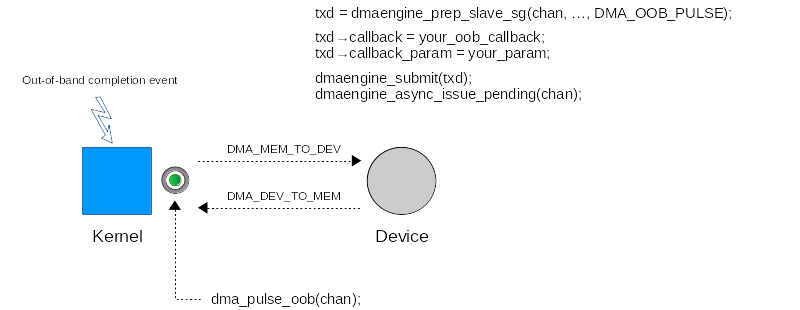DMA
A cornerstone of many real-time capable drivers which can process requests from the out-of-band stage is DMA support. Being able to offload data transfers to a DMA unit goes a long way toward implementing efficient acquisition loops, especially if they have to run at high frequency, sparing precious CPU cycles.
In order to support out-of-band transactions, a DMA controller
(e.g. bcm2835-dma, or imx-sdma) must include Dovetail-specific
changes. Since DMA drivers are commonly based on the virtual channel
layer (aka virt-dma), Dovetail adds the required changes to this
layer in order to cope with execution from the out-of-band stage. The
current list of DMA controllers which support out-of-band transactions
is available at this location.
Out-of-band DMA channel
Dovetail introduces a simple interface for switching a DMA channel to
out-of-band mode, based on special flags passed to any of the
supported prep calls, such as dmaengine_prep_slave_sg(),
dmaengine_prep_slave_single() or dmaengine_prep_dma_cyclic(). This
mode remains active until dmaengine_terminate_async() (or the
deprecated dmaengine_terminate_all()) routine is called for the
channel, which is therefore reserved for out-of-band operations until
terminated.
Two modes of operation are available for running a DMA channel out-of-band:
-
the common cyclic mode, where an I/O peripheral is driving the data transaction, triggering transfers repeatedly on a periodic basis. If the
DMA_OOB_INTERRUPTflag is passed todmaengine_prep_dma_cyclic(), the DMA completion callback set for the TX descriptor (seestruct dma_async_tx_descriptor) is called at the end of each cycle from the out-of-band stage, so that such callback can wake up real-time capable tasks without involving any non-deterministic in-band activity. A typical use case is that an application on the Linux side with strict low latency timing requirement runs the data exchanged with an audio codec through some processing pipeline. -
the new pulsed mode introduced by Dovetail, in which the kernel software wants to trigger every data transfer manually and repeatedly, acting as the master side of the transaction. This mode should be available from any type of DMA transaction the out-of-band capable driver supports, but the cyclic one. It is turned on by passing the
DMA_OOB_PULSEflag to the corresponding prep call, such asdmaengine_prep_slave_sg()ordmaengine_prep_slave_single(). Once the transfer is completed, any callback set for the TX descriptor is fired from the out-of-band stage. The key aspect is the ability to trigger multiple transfers and receive the corresponding completion events directly from the out-of-band stage using a single TX descriptor, which is different from the usual case in which every TX descriptor describes a single transfer which might be delayed by other pending operations. A typical use case is with implementing closed-control loops driven by the Linux system with stringent timing requirements, for instance over a SPI bus.
Programming a DMA channel for out-of-band operation
Cyclic transaction
The way to set up a cyclic transaction with out-of-band completion events is straightforward:
-
create a cyclic DMA transaction via
dmaengine_prep_dma_cyclic(), OR’ing theDMA_OOB_INTERRUPTflag into the flags parameter. This flag ensures that the completion callback set into the DMA TX descriptor is called from the out-of-band stage. -
submit the transaction by a call to
dmaengine_submit(), -
finally bring this transaction to active state by issuing the pending DMA requests the way you would do for common transactions using
dma_async_issue_pending(). Once your out-of-band transaction is picked by the DMA engine for execution, it has a lock on the channel until terminated.
Setting up a DMA transaction for cyclic out-of-band transfers

Pulsed mode transaction
A DMA transaction of pulsed transfers is a common slave transaction for the most part, except that each transfer must be started manually by a call to dma_pulse_oob() for the related channel. To set it up, you need to:
-
create a slave DMA transaction via
dmaengine_prep_slave_sg()ordmaengine_prep_slave_single()for instance, OR’ing theDMA_OOB_PULSEflag into the flags parameter. This flag ensures that:-
each transfer in either direction can only be started at your command by a call to dma_pulse_oob() instead of leaving this decision to the DMA engine,
-
the completion callback set into the DMA TX descriptor is called from the out-of-band stage each time such a transfer has completed.
-
-
submit the transaction by a call to
dmaengine_submit(), -
finally bring this transaction to active state by issuing the pending DMA requests the way you would do for common transactions using
dma_async_issue_pending(). Once your out-of-band transaction is picked by the DMA engine for execution, it has a lock on the channel until terminated.
Setting up a DMA transaction for pulsed out-of-band transfers

This routine triggers the next transfer on a DMA channel set up for a pulsed mode transaction, either for sending or receiving data depending on the prep call.
The DMA channel descriptor for which to start the next transfer.
Zero is returned on success, otherwise:
- -EIO. No transfer from an out-of-band transaction is ready to be
started manually. Typically, chan was not previously switched to
out-of-band operation mode by submitting a TX descriptor bearing
DMA_OOB_PULSE, followed by a call todmaengine_submit(). You may also need to tell the DMA engine to start processing the pending transactions by callingdma_async_issue_pending()right after submitting the TX descriptor.
An out-of-band completion handler executes in out-of-band IRQ context, so you may only run code which is legit there.
